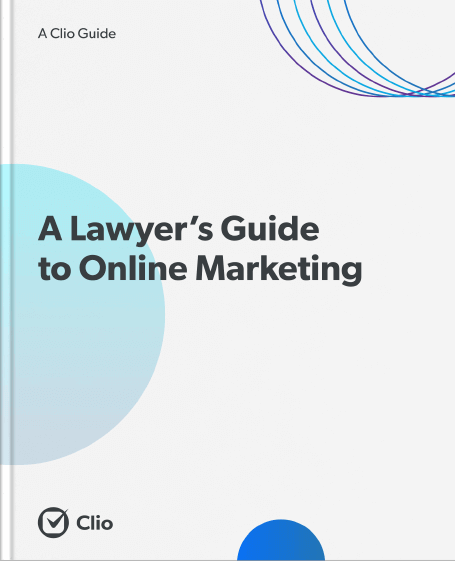If you want your clients to find you online (and show up above your competition), you need to consider investing in law firm SEO.
To help you enhance your SEO skills, we’ve developed a guide that outlines the basic fundamentals of SEO for law firms. This guide focuses on SEO for lawyers who are at the very beginning stages of developing an online lead generation strategy.
By the end of this guide, you will:
- Gain a solid understanding of what SEO for law firms is
- Learn the tactical strategies for implementing SEO
- Understand what to look for when hiring a vendor specialized in lawyer SEO
What is SEO for lawyers?
SEO, or Search Engine Optimization, is the practice of driving more visitors to your law firm’s website by increasing your website’s position in search engine results pages. In other words, the links that show up after you enter something on Google, Bing, or another search engine.
If your law firm appears near the top of search engine results, specifically on the first page, you’ll get more visitors to your website. SEO doesn’t include any ads that show up in the results.
Once visitors click on your link within the organic results (and if your website provides them with the initial information they need and are looking for), they’ll reach out to you to learn more about your services and book an appointment.
Does SEO work for lawyers?
Absolutely—when it’s done right.
The big challenge that persists when it comes to SEO for law firms is trying to figure out how to get your law firm to the top of the organic search results.
Although there are plenty of vendors offering lawyer SEO, there are no foolproof plans or guarantees that you’ll be able to rank in the number one position of the organic search results.
Fortunately, there are a variety of ways to improve your chances of ranking on the first page of the search results. We’ve broken these down into three main factors to help your law firm rank.
Why is SEO for lawyers so important?
If you’re a law firm looking to grow your business, organic search traffic is a significant marketing channel that you need to have your eyes on.
According to legal professionals in our most recent Legal Trends Report, their law firm’s website is one of the most-used channels for promoting their services: 74% of surveyed lawyers currently use their firm website to promote or market their services to potential clients.
Think about your prospective clients. One of the first things they’re going to do when navigating a legal concern, like divorce, is turn to Google to search for a divorce attorney. And, depending on your website and SEO efforts, you’ll either show up in that search—or not.
Next, let’s explore each of the factors that are important to SEO ranking.
SEO ranking factor #1: Content

What does good website content look like when it comes to legal firm SEO?
It ultimately comes down to being able to achieve the following three criteria:
1) Your content needs to answer the inquiry or search term used by the user
For example, if you want your law firm’s website to show up for the keyword “criminal lawyer in Maryland,” you need to have specific content on your website that tells your potential client about your practice area—in this instance, criminal lawyer in Maryland.
Think about it from the perspective of your potential clients. If they land on your website, they’re probably wondering:
- Is this law firm located in Maryland?
- Does this law firm practice criminal law?
- Can this law firm service my particular need?
- Is this law firm any good?
- Is this law firm within my price range?
- Do I want to do business with this law firm?
The content on your law firm website should be able to provide preliminary answers to the questions a potential client would have.
That’s because search engines are looking to send users to the best place possible to find answers to their questions. So, if Google thinks your site is likely to fulfill the user’s intent, it is more likely to feature your website higher up in its search engine results pages. In this case, Google would be potentially taking an active role in generating leads for your law firm.
Another way to use content to attract clients is to add reviews to your website. Clio’s Legal Trends Report found that client reviews are the most influential factor in getting hired. Promoting positive client reviews is a powerful way to stand out from the crowd and give potential clients the information they want.
Pro Tip: Think about the best way your law firm can answer a website visitor’s questions. This might include clear descriptions of your services, transparent pricing, or customer testimonials. Also, make sure that the content and answers on your site are up-to-date!
2) Your content needs to be keyword optimized
Answering a visitor’s questions is great. But how does a search engine know that you’re doing a good job of providing answers? And what impact does answering those questions have on SEO for law firms?
Enter: keywords.
When Google (or any other search engine) evaluates your website, it sends an automated bot to read the content on your site to understand what each web page is about.
To help potential clients read your content, you have to make it clear which keyword is targeted for each page on your law firm’s website. This makes it clear not only to visitors but also to search engines, that you are indeed a “criminal lawyer in Maryland.”
To fully optimize your content for keywords, it’s important to place your keywords in the following areas of the page:
- Title tag
- Description tag
- Headings and subheadings
- Evenly throughout paragraphs
- The web page’s URL
Pro Tip: If you run a small law firm, chances are most of your clients are local, and they live in the same general area as you do. To show up in local search results, you can optimize your website for local SEO. Here is a five-step guide to local SEO for lawyers.
3) There should be a variety of content that addresses keywords within the same category
This is one of the more difficult parts of law firm SEO.
It involves identifying a primary keyword, and then uncovering variations or long-tail forms of that keyword. This ensures that your content is able to cover as much ground as possible when users are searching online.
Many people will search by the most common keyword, but others will ask questions in natural language or enter variations of the same keyword. The goal is to create as much content as possible that addresses search inquiries related to your primary keyword.
Going back to our example, if the primary keyword you want to rank for is “criminal lawyer in Maryland,” variations of the keyword could be “best criminal lawyer in Maryland” and “price range for criminal attorney in Maryland.” Targeting both “lawyer” and “attorney” ensures you capture a broader range of potential searches.
|
‘Matters’, a podcast from Clio, helps lawyers and legal professionals alike put new strategies and tactics into place that will dramatically impact their law firms. In Episode 5: Why Online Presence Matters, legal marketing expert Gyi Tsakalakis of AttorneySync and Minneapolis-based attorney Jess Birken cover the basics and benefits of managing your law firms’ online presence. |
SEO ranking factor #2: Backlinks and off-page citations

Great content is one thing, but the internet is like a big sea of never-ending content that goes beyond the horizon.
This raises the question: how does Google determine which content is the best to show on the first page of rankings?
One major factor is the quality and quantity of backlinks—which are referral links placed on other websites that point traffic to your website.
For SEO, backlinks work like a popularity contest. If your law firm gets lots of links from other popular websites, they are essentially viewed as votes, indicating that “the attorneys at this law firm know what they’re talking about!”
But if your law firm’s website has only a few backlinks, that’s a signal that your popularity and credibility are low.
Despite their importance, 66% of pages have no backlinks, while 26% only have links from three sites or less.
Remember: Search engines want to send users to the best place possible to get their questions answered. If search engines see that your law firm’s content has many referring links from other credible websites, you’ll be viewed as a trusted and reputable source.
Increasing local SEO for law firms through off-page citations
The “popularity contest” metaphor can be extended beyond referring links if you’re looking to optimize local SEO for law firms. The contact information of your legal firm shows up in all kinds of places on the web; making it visible to both the search engine and potential clients.
That’s why the best way to gain more exposure from local SEO is to obtain backlinks from places where business contact information is displayed (i.e., citations). This will be crucial to your firm’s long-term SEO success.
Here are some examples of places where you can get off-page citations to improve your local SEO:
- Legal directories, such as Avvo
- Local directories, including Google Business Profile
- Social profiles, like Twitter, Facebook, etc.
- Shares of your content on social media
- Reviews and endorsements on other websites
ProTip: Link building is a time-intensive process, but it can yield significant results and is an integral part of your SEO success. Here are some suggestions on how to get backlinks from relevant sources:
- Offer free legal expertise or analysis to a local media organization
- Write interesting blog articles related to your legal expertise, and ask your network to share them
- Present at local events
For more link-building ideas that will boost your law firm SEO, check out this guide to link building for lawyers.
SEO ranking factor #3: Technical SEO

When it comes to SEO for law firms, we’ve saved the best for last: Technical SEO.
Like no other factor, technical SEO can make or break your law firm SEO performance, making it a major contributor to your SEO success.
Yet, it’s also the hardest to get right. Especially if you aren’t an SEO expert.
Technical SEO is, in very basic terms, a measure of how “Google-friendly” your law firm’s website is. Whilst similar to user-friendliness, technical SEO also extends to other things like security and sitemaps.
Because it can get complicated to execute, so many law firms decide to hire an SEO consultant specialized in law firm SEO. It reduces the risk versus trying to handle everything yourself.
Here are some things to keep in mind about technical SEO:
Make sure your firm’s website follows all of Google’s guidelines
Google is quite transparent about the things you can do to improve your law firm’s technical SEO. Familiarize yourself with the Webmaster Guidelines for tips on technical SEO.
Make sure your firm’s website is fast and mobile-friendly
Two basic (but important) factors for technical SEO include ensuring that your website:
- Loads fast—aim for under 2.5 seconds
- Renders well across a variety of screen sizes, especially mobile phones.
Make sure your law firm website is easy to navigate
What happens if your law firm’s website is easy for a person to navigate?
Chances are, a robot sent by Google to investigate your law firm’s website will be able to:
- Find all your pages
- Understand what those pages are about.
That’s why it’s important to create simple and easy-to-use menus, and link to other important pages on your website frequently.
For more tips on how to create a law firm website, be sure to visit our digital marketing for lawyers hub.
Get everything set up properly
One good thing about technical SEO is that you just have to make sure you are set up with strong technical SEO from the beginning. Once that’s done, and if your law firm website is relatively small, then you should be able to work stress-free for the most part.
How to implement SEO for lawyers

There are two ways to level up your law firm SEO based on the above factors—and ultimately, get your law firm’s website to rank well in the search engine result pages.
- You can do it yourself.
- You can hire an expert who has experience in SEO for law firms to help you out.
Option #1: Implement SEO yourself
Learn more
This post should be just the beginning of your journey into the foray of SEO for law firms. Start by reading and understanding the Moz beginner’s guide to SEO and Google’s Webmaster Guidelines.
Do keyword research
Here’s a quick way to generate some content ideas for your law firm website:
- Write down all of your law firm’s specialities, services, and locations.
- Do keyword research. To start, for each practice area/service and city combination, use synonyms to generate three or four alternative ways of saying the same thing.
Learn more about how to do keyword research
Write and publish content for your website
Here are the steps:
- For each practice area and city combination that you identified in step #2 (keyword research), create another list of the top 20 priorities that a customer might have when considering hiring you. Consult your client intake notes for inspiration.
- For each practice area and city combination, write an easy-to-understand summary of your legal service that includes information about all of your customers’ priorities.
- Look for opportunities to add some of your keywords, but don’t go overboard. Remember to use keywords in the title, meta description, and headings.
- Publish each summary on a separate page of your website.
- Use website calls-to-action to show clients where to go to book your services.
- And finally, don’t forget the other law firm website basics.
Make sure your law firm website is technically sound when you start implementing SEO tactics
Making sure your website is set up with all the technical requirements can be challenging, which is why we recommend getting external help from an SEO expert for your law firm. But if you decide to pursue it on your own, we recommend referring to Google’s Webmaster Guidelines.
Build your presence and links
- Claim all of your online profiles.
- Invest in a tool like Brightlocal to automate submitting your law firm to various local directories.
- Encourage your customers to leave reviews by following these tips.
- Keep your content up to date by blogging and updating your website pages monthly.
- Pick at least five backlink building projects from this list, and aim for five new links every month.
Option #2: Hire a law firm SEO expert

SEO is a very rewarding—yet time-intensive—task. The reality of the situation is that many lawyers simply don’t have the time or inclination to learn a new discipline.
Sound like you? You’re not alone. The 2022 ABA Legal Technology Survey Report found that 28% of law firms have hired a consultant or agency to assist with SEO.
You can see a list of the best law firm SEO companies here, but additionally, here are some things to keep in mind when looking for an expert that will help boost your law firm SEO.
Budget
How much do you charge for your law services? A good SEO expert will likely charge a similar hourly rate; maybe a little less.
And as mentioned, SEO is a time-intensive task. For monthly retainer rates, $501-$1,000 per month is fairly standard, so be sure to include it in your law firm’s budget if you decide to invest in marketing initiatives.
Where to find an SEO expert for your law firm
Here’s a catch-22: The best SEO experts don’t have time to work on their own websites, so you might not find them through a simple Google search!
So instead, try asking other lawyers in your network for a referral to someone who specializes in SEO for law firms.
What to look for when hiring an SEO consultant for your law firm
At the very least, when talking to potential SEO experts, they should be mentioning the foundations that we described in this guide. Ask them about the role of content, backlinks, and technical SEO, and for examples of their experience.
Finally, be sure to check their references, particularly from other law firms. They need to understand the industry and the particular pain points that potential clients have when looking for the services of your law firm.
Red flags that signal a poor law firm SEO consultant
- You should not ask for—or expect—an SEO consultant to guarantee results for your law firm. If they do, look elsewhere.
- Be wary of an SEO consultant who is quick to appeal to your desire for clicks, traffic, and leads. Moreover, find someone who’s willing to explain their process. They should be upfront with you about the efforts required and the results you can expect.
- Make sure that you’re not paying for them to do paid search advertising, which is different from SEO (though it is a viable alternative to SEO).
For more red flags that signal an SEO consultant that you should avoid, read the article “9 Skills Your Legal SEO Writer Should Have.”
Parting thoughts on SEO for lawyers
SEO for lawyers is a marathon, not a sprint. Don’t expect to see your law firm’s search engine rankings improve right away. Keep focusing on writing great new content that’s relevant to potential clients, building backlinks, and following Google’s Webmaster Guidelines, and generating client reviews.
Of course, one of the best ways to ensure you are found is with a quality website. Better yet if you can create that website without learning to design or code, like with Clio Grow’s website builder (it helps law firms create simple, single-page websites and it’s already integrated with existing Clio features).
The bottom line: Be patient. If you’re able to execute better in quality and quantity versus competitors, you’ll rise up the rankings.
Law firm marketing experts share their top tips - for free
Get law firm marketing tips from experts Gyi Tsakalakis, Josh King, and Kevin O'Keefe in our free ebook.
Get the Guide


